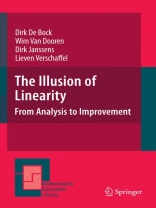Linear or proportional relationships are a major topic in mathematics education. However, recent research has shown that secondary school students strongly tend to apply the linear model also in situations wherein it is not applicable. This overgeneralization of linearity is sometimes referred to as the ‚illusion of linearity‘ and has a strong negative impact on students’ reasoning and problem solving skills.
‚The Illusion of Linearity: From Analysis to Improvement‘ presents the reader with a comprehensive overview of the major findings of the recent research on the illusion of linearity. Although the empirical study of students’ improper linear reasoning clearly constitutes a new line of research, it owes a great deal to prior work in mathematics education research community (such as the work of the scholars of the Freudenthal Institute on realistic mathematics education).
Based on both quantitative and qualitative research, ‚The Illusion of Linearity: From Analysis to Improvement‘ discusses the following issues: (1) how the illusion of linearity appears in diverse domains of mathematics and science and how it is conceptually related to other more general misconceptions identified in the research literature, (2) what are the crucial psychological, mathematical, and educational factors being responsible for the occurrence and persistence of the phenomenon, and (3) how the illusion of linearity can be remedied by appropriate instruction.
‚The Illusion of Linearity: From Analysis to Improvement‘ is essential to those working in mathematics education, particularly teacher educators and curriculum research and development.
Inhaltsverzeichnis
A Widespread Phenomenon.- In Search Of Empirical Evidence.- Searching For Explanations: A Series Of Follow-Up Studies.- An In-Depth Investigation.- A Teaching Experiment.- Stepping Outside The Classroom.- Psychological And Educational Analysis.












